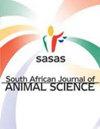Solvent-extracted cashew nut meal as a dietary protein source for layer chicks
IF 0.7
4区 农林科学
Q3 AGRICULTURE, DAIRY & ANIMAL SCIENCE
引用次数: 0
Abstract
This study aimed to produce a low-fat cashew nut meal (CNM) containing less than 6% fat and assess its effect on layer chick growing performance and health status. The experiment used 225 one-day-old layer ISA Brown chicks with an average live weight of 27.38 ± 1.85 g, divided into 15 batches of 15 animals each. Five diets containing 0, 25, 50, 75, and 100% CNM as a replacement for soybean meal were tested. The test included three replicates of 15 chicks for each diet. The CNM was obtained after oil extraction using an automatic press followed by solvent extraction. The CNM contained 40.6% crude protein and 5.38% fat. Except for the chicks fed on the 100% CNM diet that had the worst growth performance parameters, those on the other diets had an average final live weight of 662.13 g and an average feed conversion ratio of 2.76. The highest average daily gain (15,07g/d) was observed in chicks on the 75% CNM diet. Hematological analyses showed no marked difference between the animal groups. Regarding the blood biochemical profile, the total cholesterol levels were similar in the chicks for all diets. High-density lipoprotein cholesterol levels were 1.4 times higher in the chicks fed on CNM-based diets compared to those fed a soybean meal-based diet. It was concluded that low-fat CNM could replace soybean meal by up to 75% in layer chick feed without negative effects on growth performance and health status.溶剂萃取腰果粉作为蛋鸡的日粮蛋白质来源
本研究旨在生产脂肪含量低于 6% 的低脂腰果仁粉 (CNM),并评估其对蛋鸡生长性能和健康状况的影响。实验使用了 225 只一天龄的 ISA 褐羽蛋鸡,平均活重为 27.38 ± 1.85 克,分为 15 批,每批 15 只。试验使用了含 0、25、50、75 和 100% CNM 的五种日粮替代豆粕。每种日粮包括三个重复,每个重复 15 只小鸡。CNM 是通过自动榨油机榨油后再进行溶剂萃取得到的。CNM 含有 40.6% 的粗蛋白和 5.38% 的脂肪。除了饲喂 100% CNM 日粮的雏鸡生长性能参数最差外,饲喂其他日粮的雏鸡最终平均活重为 662.13 克,平均饲料转化率为 2.76。使用 75% CNM 日粮的雏鸡平均日增重最高(15.07 克/天)。血液学分析表明,动物组间没有明显差异。在血液生化指标方面,所有日粮中雏鸡的总胆固醇水平相似。与饲喂豆粕日粮的雏鸡相比,饲喂 CNM 日粮的雏鸡的高密度脂蛋白胆固醇水平高出 1.4 倍。研究得出结论,在蛋鸡饲料中,低脂 CNM 可替代高达 75% 的豆粕,且不会对生长性能和健康状况产生负面影响。
本文章由计算机程序翻译,如有差异,请以英文原文为准。
求助全文
约1分钟内获得全文
求助全文
来源期刊

South African Journal of Animal Science
农林科学-奶制品与动物科学
CiteScore
1.50
自引率
0.00%
发文量
39
审稿时长
>36 weeks
期刊介绍:
The South African Journal of Animal Science is an open access, peer-reviewed journal for
publication of original scientific articles and reviews in the field of animal science. The journal
publishes reports of research dealing with production of farmed animal species (cattle, sheep,
goats, pigs, horses, poultry and ostriches), as well as pertinent aspects of research on aquatic
and wildlife species. Disciplines covered nutrition, genetics, physiology, and production
systems. Systematic research on animal products, behaviour, and welfare are also invited.
Rigorous testing of well-specified hypotheses is expected.
 求助内容:
求助内容: 应助结果提醒方式:
应助结果提醒方式:


